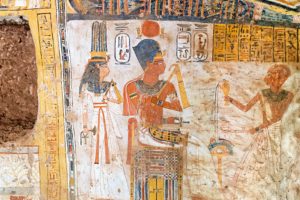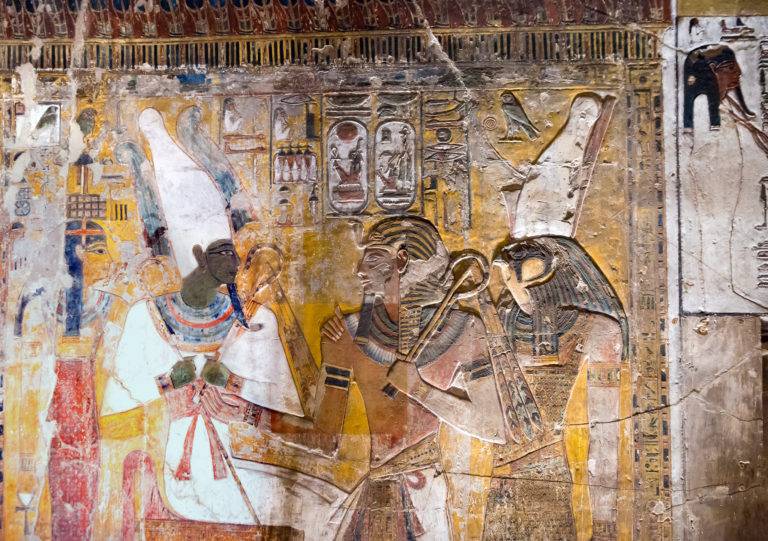Perfume in Ancient Egypt

Imagine walking into a temple in ancient Thebes. The air is filled with the smoke of frankincense. Priests move gracefully through the clouds of incense, and shiny alabaster jars hold scented oils in the flickering light. For the Ancient Egyptians, perfume was essential to life. It served as medicine, played a role in rituals, was used for seduction, and connected them to the divine. Today, the history of Egyptian perfume still interests travelers, historians, and perfumers.
This guide looks at the origins, uses, and lasting impact of perfume in Ancient Egypt. It also shows you where you can experience this fragrant history on your travels.
The Origins of Perfume in Ancient Egypt
Perfume in Egypt has a history of over 5,000 years, with evidence dating back to 3000 BCE. The Egyptians believed that fragrance was a gift from the gods. Nefertum, the god of perfumes and healing, often wore a lotus blossom on his head. The lotus flower opens in the morning and closes at night, symbolizing rebirth and purity. This made it one of the most important ingredients in their perfumes.
Archaeologists have found alabaster jars, decorative cosmetic spoons, and tomb paintings showing perfume cones melting on wigs at feasts. These discoveries show that perfume was both practical and meaningful, an important part of Egyptian culture.
Perfume in Daily Life: Hygiene, Status, and Pleasure
Egypt’s hot and dry climate made oils and ointments very important. People used perfumed salves to keep their skin moisturized, protect against the sun, and cover up odors. Unlike in some later cultures, both men and women used perfume daily.
Perfume also meant something socially. Not wearing fragrance was seen as uncivilized, while wearing it showed refinement. At banquets, guests wore perfumed cones on their wigs. These cones slowly melted and released fragrance throughout the evening. They were not just decorative; they also symbolized abundance and hospitality.
For wealthy Egyptians, perfume was a status symbol. Imported ingredients like cinnamon and saffron were costly, and wearing them showed wealth and sophistication.
Luxor Tours & Activities
Looking to save some costs on your travel? Why not join a shared group tour to explore Luxor, Egypt? Here are some activities you might be interested in:

Perfume and Religion: The Scent of the Divine
Perfume played an important role in ancient Egyptian religion. Temples filled with incense smoke were believed to carry prayers to the gods. Priests used scented oils to purify themselves before rituals, and they anointed statues of deities each day.
During incense rituals, they burned frankincense, myrrh, and a famous blend called kyphi, which included 16 ingredients like honey, wine, raisins, and resins. People believed kyphi helped them relax, sleep better, and connect with the divine.
In funerary rites, perfume was crucial for preparing the dead for the afterlife. They anointed mummies with oils and placed jars of unguents in tombs to ensure eternal purity.
Sweet scents symbolized order, purity, and closeness to the gods, while bad smells represented chaos and impurity. Perfume was more than just a fragrance; it was a reflection of their beliefs.

Ingredients and Recipes: What Made Egyptian Perfume Unique
Egyptian perfumes were renowned for their richness and complexity. They combined local botanicals with exotic imports, creating blends that were both luxurious and symbolic.
Local Ingredients
- Lotus and blue water lily: Sacred flowers linked to rebirth.
- Henna: Used for both fragrance and cosmetics.
- Papyrus and rushes: Infused into oils.
Imported Luxuries
- Frankincense and myrrh: Brought from Punt (modern Eritrea/Somalia).
- Cinnamon and cassia: Imported from Asia.
- Saffron: A prized addition to elite blends.
Famous Perfume Recipes
- Susinum: Based on lily, myrrh, and cinnamon.
- Mendesian: A blend of myrrh, cassia, and resins, named after the city of Mendes.
- Cyprinum: Made with henna, cardamom, cinnamon, and myrrh.
- Stakte: A strong myrrh-based perfume.
Unlike modern alcohol-based perfumes, Egyptian perfumes were oil-based, giving them a thicker, longer-lasting quality. Recipes were closely guarded, often prepared by priests who doubled as perfumers.

Perfume and Power: From Pharaohs to Cleopatra
Perfume had a political role. Pharaohs used fragrance to show their divine status, making them seem like they “smelled like gods.” They also used perfume as a diplomatic tool by giving precious oils as gifts to foreign rulers.
Cleopatra VII is a prime example of this. Ancient writers talked about her perfumed sails that spread her scent across the Nile before she even arrived. This overwhelmed guests and created an impression of luxury and seduction. Cleopatra used fragrance not just for vanity but as a strategy to improve her image as both queen and goddess.
Perfume in the Afterlife: Scent Beyond Death
The Egyptians believed that life continues after death, and perfume was important for preparing for eternity. Tombs often had alabaster jars filled with oils, and mummies were anointed with fragrant resins to preserve their bodies and please the gods.
Perfume cones appeared in tomb paintings, symbolizing eternal feasting and celebration. Using fragrance in funerary rituals showed the belief that scent could purify the soul and ensure a safe journey into the afterlife.

The Global Influence of Egyptian Perfumery
Egypt was the perfume capital of the ancient world, and its influence reached far beyond its borders. Greek and Roman writers praised Egyptian perfumes as the best. Cities like Mendes and Alexandria became important trade centers for these scents.
Pliny the Elder stated that no other perfumes matched the quality of those from Egypt. Julius Caesar showed off Egypt’s perfume wealth by throwing bottles into the Roman crowd during his triumph.
Egyptian perfume recipes inspired Roman perfumers, who adapted blends like Mendesian for their markets. This widespread influence meant that Egyptian perfumery continued even after the pharaohs, shaping the fragrance traditions of the Mediterranean for centuries.
Fun Facts and Curiosities
Egyptian perfumery has many interesting details that show the culture:
1. Perfume cones: People wore wax cones filled with oils on their wigs during banquets. The cones melted slowly, releasing fragrance.
2. Perfume as medicine: The Ebers Papyrus contains recipes for scented remedies that treat headaches, skin problems, and even spiritual issues.
3. Priests as perfumers: Priests prepared sacred perfume recipes and kept them secret, as if they were state secrets.
4. Perfume bottles: Egyptians stored their perfumes in alabaster jars, blue glass bottles, and containers shaped like animals or plants.

Where to Experience Egyptian Perfume Today
For modern travelers, Egypt offers chances to connect with its rich perfume heritage:
– The Egyptian Museum (Cairo): This museum features alabaster perfume jars, cosmetic spoons, and containers used for oils.
– Luxor & Karnak Temples: You can see reliefs that show incense rituals and offerings.
– Valley of the Kings and Queens: Tomb art displays perfume cones and scenes from banquets.
– Perfume workshops in Cairo and Luxor: Many shops sell oils based on ancient recipes, giving visitors a way to experience history through scent.
Travel tip: When you visit modern perfume shops in Egypt, they often offer oils said to be inspired by ancient blends like Susinum or Mendesian. While these are new creations, they provide an interesting way to explore history through scent.
Got a Question?
F.A.Qs
They used blends like Susinum (lily, myrrh, cinnamon), Mendesian (myrrh and cassia), and Cyprinum (henna, cardamom, cinnamon, myrrh).
Perfume was tied to religion, hygiene, social status, and funerary practices. It was considered a divine gift and a symbol of purity.
Lotus, blue water lily, frankincense, myrrh, cinnamon, saffron, and henna were among the most common.
Yes. Ancient sources describe Cleopatra’s legendary use of perfume as both personal adornment and political strategy.
Did you know that
By purchasing through our links, you support us at no additional cost.
Thank you for your support. ♥️





